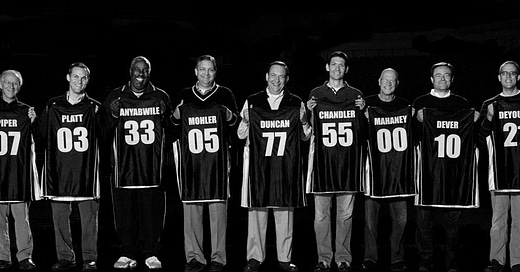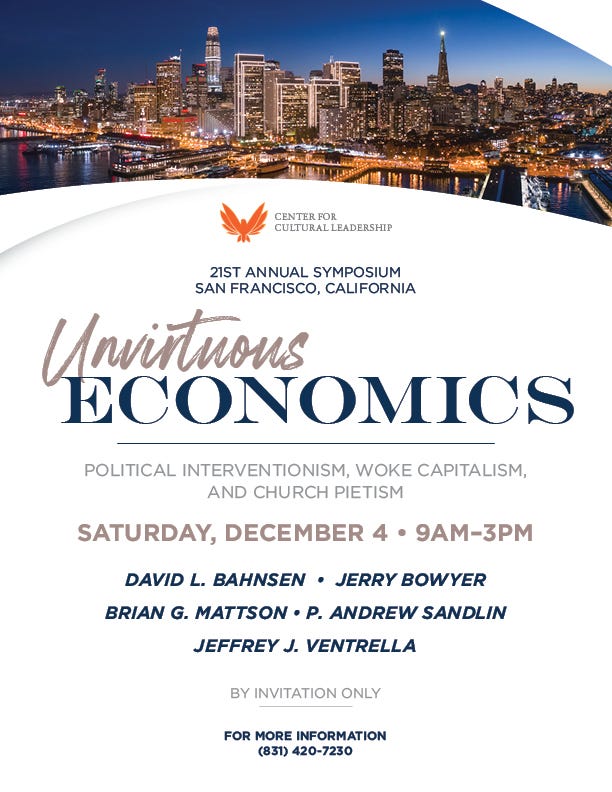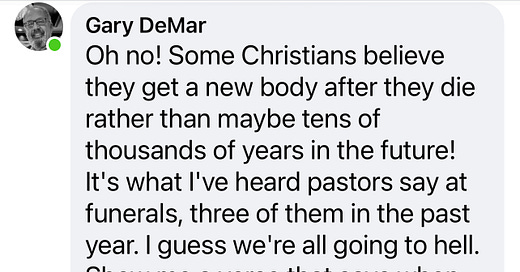
No Longer Together 4 the Gospel
T4G has painfully learned that because theology is the fruit of worldview, a generally sound theology, while creditable, is no guarantee of biblical fidelity.
Dear friends and supporters,
Contemporary conservative Protestantism is being riven over the worldview conflicts inflaming our culture. A prime reason it has not been able to weather our current cultural conflagration is that it has long been deeply ensconced in a warm, otherworldly ecclesiastical theology (see “The Free-Floating Irrelevance of Ecclesiastical Colonization”). As long as the chief alien worldviews stayed mostly outside the church as they did during much of the 20th century, the church could maintain a strong unity on nothing but narrow, orthodox, ecclesiastically theological premises.
However, when in recent years, relentless alien worldviews began to adapt themselves to ecclesiastical theology, forming “churchly” versions of the wider cultural ideologies, the division came hard and fast.
The latest example is Together for the Gospel (T4G), a popular annual conference and organization launched over 15 years ago by men like Mark Dever, Ligon Duncan, Al Mohler, C.J. Mahaney, John Piper, and R. C. Sproul to revive Reformed and Puritan soteriology (salvation doctrine), often shorthanded to “the doctrines of grace,” which essentially describes the famed Calvinistic acrostic TULIP: total depravity, unconditional election, limited atonement, irresistible grace, and perseverance of the saints.
This soteriology has not been the majority report among most of 20th century evangelicalism, and T4G appealed to seminarians and young church leaders (and others) hungry for something more substantive than bland, broad evangelical soteriology, which (it was held) did not sufficiently stress salvation by grace and God’s sovereign work in our salvation. To vanilla evangelicals, this is heady stuff.
United by Soteriology, Divided by Worldview
But Collin Hansen, noted chronicler of this organization, recently reported that next year will be the final meeting of T4G, which is dissolving partly due to increasing differences over public theology:
I observed that when T4G started, soteriology preoccupied dorm-room and seminary debates. Thanks in large part to T4G, ecclesiology gained urgency a few years later as these young leaders moved into pastoral ministry. Between 2014 and 2016, public theology began to dominate church discourse.
I didn’t know in 2018 if T4G and this so-called YRR [Young, Restless, Reformed] movement could withstand these divisions. Statements such as Article XVII in T4G’s affirmations and denials—“We acknowledge that the staggering magnitude of injustice against African-Americans in the name of the Gospel presents a special opportunity for displaying the repentance, forgiveness, and restoration promised in the Gospel” — didn’t cause a stir in 2006. By 2018 they would be considered by some as evidence of theological downgrade.
Earlier, he had written,
Coalitions don’t last forever. President Obama was elected after I wrote Young, Restless, Reformed. Can the YRR movement survive the disagreement that persists regarding Black Lives Matter and President Trump? I see today on both sides of our debates over public theology that some Reformed folks find more in common with even non-Christians than with other Reformed folks. In other words, there’s hardly a unified view on how justice and justification relate. No unified view on the role of the church in leading the cause against injustice in fallen world. Some say if we just preach the gospel, we’ll see change. Others point out that churches have long preached the gospel and still defended, blessed, and even engaged in sins such as slavery and segregation.
Although Hansen doesn’t specify all the divisive issues, he does highlight racial reconciliation, reparations, and Black Lives Matter, as well as sexual abuse in the church and the Trump presidency. It’s possible that other hot-button issues include immigration, same-sex attraction ( = temptation), the George Floyd killing (“defund the police”), and the politically oppressive Covid policies.
The differences over public theology as well as ecclesiology (the doctrine of the church) now spell the doom of T4G. A ministry that could unite around “the doctrines of grace” could not survive the implications of public theology, shaped by one’s worldview.
Confessions of Faith: Necessary, Not Sufficient
Why? Because worldviews are what drive public theology. (By “worldview,” I mean an inescapable and almost instinctive picture and interpretation of the world each person holds.) Worldviews drive all theology, in fact, but they are much more evident and widespread in public theology. While issues like abortion, gay “marriage,” immigration, “social justice,” economic policy, political philosophy, racial harmony, BLM, and the role of the state are by no means unrelated to what we generally term theology, there is almost no correspondence between one’s theological affirmations these days and one’s worldview reflected in these and other “public” issues.
This assertion needs some unpacking, so think of it this way: one can stoutly affirm the Westminster Confession of Faith while supporting statist Covid vaccine mandates, or advocate the London Baptist Confession concurrently championing Critical Race Theory (CRT). Many, in fact, do. Theology, including theology codified in a popular conservative confession of faith, is not incompatible with a public theology widely at variance with a biblical worldview.
(continued below)
Shows (1) that it is un-Biblical to be Cross-centered, (2) that grace without obedience is not true grace, and (3) that godly criticism of ungodliness does not undermine grace.
Get the ebook here.
(continued)
Private versus Public Theology
A chief reason this is happening is that theology since the demise of Protestant Christian culture in the West increasingly became “private” theology, ecclesiastical theology, that is, theology limited largely to the church. It has not been grounded in what Abraham Kuyper termed a total world-and-life view. It might sound strange to modern ears to realize that worldview is not the result of theology, but theology is the result of worldview.
This seems backwards to many Christians, who believe that while Christian theology is based on revelation (biblical exegesis), Christian worldview is based on theology. But Christian worldview no less than theology is based on revelation (the Bible, creational norms, and the Holy Spirit). The Holy Spirit opens our minds and hearts to a proper interpretation of creation (reality), including the Bible, creation, and Jesus Christ. This “proper interpretation” is the Christian worldview that dictates a biblical theology. It’s possible to interpret the Bible without a Christian worldview, and most people do it all the time. Just think of the theological liberals infesting the Society of Biblical Literature.
From Heart –> Worldview –> Theology
Herman Dooyeweerd has argued that the very root of our life is what the Bible terms the heart, the core of our being. It is either depraved and turned toward apostasy, or redeemed and turned toward God. The heart frames our entire viewpoint about everything. In other words, each of us reflects in principle a devout worldview or an apostate worldview. None of us is perfectly consistent, of course, and Christians are constantly being tempted to alter a devout biblical worldview under the pressures of the surrounding apostate worldview.
The reason the phrase “the Gospel presents a special opportunity for displaying the repentance, forgiveness, and restoration promised in the Gospel” posed no controversy at the inception of T4G but more recently has divided the organization is that the onset of the popularity of CRT, BLM, and “white supremacy” sensitized many within the T4G fold to the secular, contra-biblical interpretation to which that phrase has been put. It’s not so much the T4G constituency that’s changed over the last 15 years. It’s that the changed culture has uncovered defects in the worldview language at the founding.
This is also how it’s possible to combine the boldest affirmation of monergist soteriology with a highly syncretist worldview. If your thinking is shaped by the biblical storyline, which is creation–fall-redemption, rather than TULIP soteriology, you will almost certainly arrive at the latter while gaining much, much more. But you can preserve biblical soteriology while wildly deviating from the biblical worldview and, in turn, public theology.
From Biblical Worldview to Public Theology
If we do that, we will be more prone to understand that creation is very good and that man’s chief calling is to exercise dominion for the Lord’s glory (Gen. 1:26–28). We will work to bring every area of life and thought under the authority of Christ the King. We will perceive in Christ’s redemptive work a restoration to this glorious calling, and not the absolute center of human life. Redemption is a restoration and expansion of creation, not the transcendence or marginalizing of creation.
We will support godly hierarchy and oppose modern leveling egalitarianism (like radical feminism), while equally opposing sexual abuse and its coverup.
We will oppose old-line right-wing racism (KKK) as well as new-line left-wing racism (BLM).
We will support a radically decentralized politics such that the U. S. Founders envisioned, and oppose raw statism instantiated in, for example, Covid lockdown measures and politicized vaccine mandates.
These are examples of a public theology springing from a biblical worldview. They are controversial only for conservative Christians nourished on a privat(ized) theology limited to soteriology.
But just as the gospel is larger than salvation, so worldview is larger than theology.
Conclusion
Why did an organization credally unified around biblical soteriology not survive? Because the cultural realities of an increasingly hostile age forces ministry viewpoints and decisions beyond soteriology. Over even the last ten years, issues within the culture (Cultural Marxism, Covid statism, “social justice,” same-sex “marriage,” “heteronormativity,” gender dysphoria, “white supremacy”) have so pervasively leavened the culture that the church itself has become a fermented loaf.
A narrowly soteric vision and basis of fellowship cannot suffice for a Christian organization or even a single local church. No church can long last whose membership includes both pro- and anti-abortion, pro- and anti-gay “marriage,” pro- and anti-statist, pro- and anti-egalitarian, and pro- and anti-CRT.
Why? Not because these are second-order theological issues that have wrongly been elevated to fundamentals, but because they are first-order worldview issues that specify the level of biblical fidelity of a church or Christian organization. T4G has painfully learned that because theology is the fruit of worldview, a generally sound theology, while creditable, is no guarantee of biblical fidelity.
Due to just this omission, it’s possible that T4G embodied from its inception the seeds of its impending demise.
A great need of the hour is the recovery in church and Christian ministries of a truly biblical world-and-life-system which, in turn, produces a biblical theology, both “public” and “private.” Christians who agree on worldview will hold together much longer than those who agree on ecclesiastical theology.
Worldview is the tail that wags the theological dog.
Will you consider a tax-deductible donation to CCL via PayPal or Venmo? Or mail a check to CCL, Box 100, Coulterville, CA 95311. God uses you to keep us going — and expanding.
Personal
This Reformation Sunday I’ll be addressing the adult Sunday school at City Church, Corpus Christi, Texas. I hope to see a number of you.
Next week I intend to write about “Tyranny with a Smile.”
Thanks to all of you who so ardently pray for and support CCL with your money. We’re forging ahead because of you.
Happy Reformation Days,
Founder & President, Center for Cultural Leadership
You can listen to this short autobiographical account here.
More great stuff:
The Center for Cultural Leadership site is here.
My Amazon author page (print and digital) is here.
You can find my sermons and lectures at my YouTube channel.
Sign up to get my blog updates here.
Here’s my Twitter feed.
If you want to get the free exclusive hard copy publication Christian Culture, please send me a Facebook private message.
The CCL phone number is 831-420-7230.
The mailing address is:
Center for Cultural Leadership
P. O. Box 100
Coulterville, CA 95311














Agreed with all you have said. Tim Keller's fall away from doctrinal fidelity is a case in point. Once he became enamored of Darwinism he followed suit by teaching and preaching it from the pulpit. The Genesis account was reduced by him to 'poetry.' Today his flagship Redeemer church in NYC endorses social justice. Another of his City Church projects endorses LBGTQ inclusion.